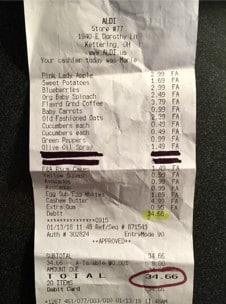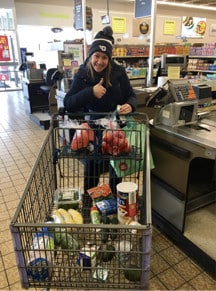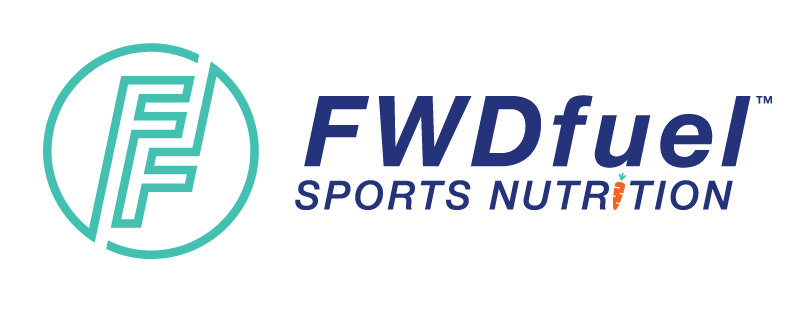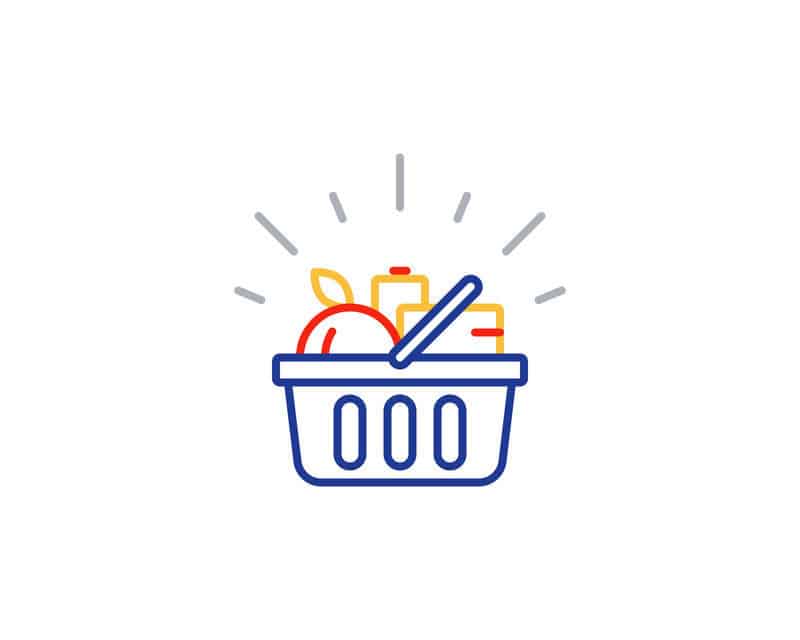“Eating healthy is SO expensive!” – “I would never be able to afford to be a vegan athlete!”
I understand it may seem like a strain on the budget to eat fresh food. These phrases may have come out of your mouth at some point, or have at least entered your mind. I know these thoughts are not uncommon because it’s I hear people say them all the time!
Due to many preconceived beliefs about the high cost of eating healthy, many of athletes, especially collegiate student-athletes, believe they can only afford to eat mac and cheese and ramen noodles. Others who are on a tight budget for a variety of reason from attempting to make it as a professional athlete or dealing with life events such as getting married or switching jobs may simply think healthy foods are not essential for peak performance so when the budget is tight, switching to cheap, processed foods is a worthy sacrifice. However, processed foods such as the aforementioned ramen noodles or mac and cheese are why the standard American diet causes fatigue.
Removing processed foods is not only essential for recovery and achieving optimal conditioning, but can be life-changing for many dealing with undesirable symptoms such as lethargy. A plant-based diet is not required to be a healthy, but it is the preference of many athletes and all athletes can benefit from eating this way a few days a week. So, get ready to learn how we do this while ballin’ on a budget.
Is the Cost Scaring you?
Your training buddies, coaches, and trainers are often hounding you about “fueling to perform.” However, the thought of spending an obscene amount of money to eat quality nutrient-rich food scares you, right? With all the new and fancy products coming out on the market as vegetarian and vegan diets become more and more popular, it is easy to get overwhelmed by the number of products. You probably feel like you need them all to be successful eating as a vegetarian or vegan athlete.
Wrong!
I am here to tell you that eating clean for vegetarian and vegan athletes is NOT impossible! So, first step, lets think about the foods that are absolute necessities when following a plant-based diet. Many of these staple foods are very affordable, even for college athletes who are living on a budget.
What Should Be on a Vegetarian or Vegan Athlete Grocery List?
A plant-based diet can look a variety of ways since there are so many different and delicious types of fruits and vegetables. Below is a list of the main staples that are essential for vegetarian and vegan athletes, as well as a few examples of each food group that fit the diet and are relatively inexpensive.
- Fruit (bananas, apples, berries, mango, cantaloupe, honeydew, pineapple, kiwi, and grapes)
- Purchase a few types of fruit that you can alternate with throughout the week. “In season” produce such as berries and watermelon in the summer, are often on sale and cheaper than those out of season!
- Vegetables (broccoli, asparagus, lettuce, spinach, cucumbers, bell peppers, carrots, kale, and zucchini)
- Veggies only stay fresh for so long, so pick a few for the week. You don’t want to overstock and have your produce spoil! Wasted money = not good!
- Grains (quinoa, rice, gluten-free bread, and oats – my favorite!)
- Legumes and Beans (edamame, tofu, chickpeas, lentils, and black beans)
- Nuts, nut butters, and seeds (almonds, cashews, walnuts, peanut butter, almond butter, cashew butter, pumpkin seeds, sunflower seeds, and chia)
- Non-dairy milk alternatives (almond, coconut, soy, and hemp)
- Many of these dairy-free options are available as vegan-friendly substitutes for yogurt, milk, cheese, and coffee creamers.
- Keep an eye out for coupons that will help cut the cost of these higher priced items.
- Here is a coupon to save $1.00 on a Ripple dairy-free yogurt!
Stick to the Basics

As mentioned, it is possible to walk into your local Whole Foods or specialty grocery store and have $100 worth of food in your cart before even getting to the produce section! If spending extra money on fancy vegan coffee creamers and organic produce is in your budget, by all means, go for it! Maybe you treat yourself to one or two “specialty” products per week. Otherwise, stick to the basics and you will be successful in keeping the cost of groceries very affordable. Below is my grocery list from this morning, and you bet it’s just under $35!
Quick and Easy Snacks:
There are many tasty snacks made with these fundamental grocery items. Here are a few “go-to” snacks that are easy, affordable, and packed with lots of nutrients.
- Bowl of oatmeal with almond butter, blueberries, or other available fruit
- Baked sweet potato bites drizzled with local honey
- Gluten-free toast with smashed avocado
- Rice cakes topped with almond, cashew, or peanut butter, and sliced bananas
- Ripple dairy-free yogurt topped with berries, bananas, chia seeds, and any nut butter
Meals Can Be Easy and Cheap Too!
You’re probably thinking, “well what am I going to eat for meals?” As a vegetarian or vegan athlete, it must be hard to plan out healthy meals ahead of time, while trying to balance class, homework, and practice! The crockpot will be your saving grace during the week! It is so easy to throw a bunch of ingredients in the crockpot first thing in the morning and have a delicious soup or chili by dinnertime.
For a list of easy crockpot recipes for vegan and vegetarian athletes, click here.
Additional Tips to Consider:
Compare prices
Do your research and compare prices at your area grocery stores. Spending the extra time comparing prices and traveling to different grocery stores might be a pain, but saving a few bucks here will make all the difference! Stores like Aldi carry many of these essential items for very affordable costs!
Choose generic brands
When purchasing packaged products, try to purchase generic brands. You’ll be shocked at how much money you can save by avoiding the name brands.
Don’t overstock
When it comes to fresh produce, try to purchase only enough to get you through the week. However, your grains, beans, legumes, and other non-perishable foods that sold in cans may be worth purchasing in bulk.
Limit specialty products and organic brands
Purchasing organic produce for its better quality may be worth the extra few bucks, but the specialty products will rack up that grocery bill, so pick and choose wisely! A helpful tool when trying to decide which items may be most important to buy organically can be found on the Environmental Working Group’s list known as the “Dirty Dozen”. The Dirty Dozen is an evolving list of foods analyzed to have the most issues in terms of harmful substances. There is also the “Clean Fifteen” which are foods that tend to be lower in harmful substances such as pesticides, even when organic. They are often foods you don’t need to necessarily buy organic even if you can afford it. These lists are modified as newer research and evidence comes available. You can find an update on the current list here. These foods may be the most important to buy in organic form. On the contrary, fruits like bananas or avocados found on the “Clean Fifteen”, are items less likely to have harmful chemicals, making them more likely to be safe when not organic.
 Hopefully, with this new information, you can see that eating vegan or vegetarian on a budget is not as difficult or expensive as it is often thought to be. It is important to note that as an athlete, you have additional needs regarding quality fat and protein compared to less active individuals. It can be more challenging as a vegan or vegetarian athlete to consume high amounts of protein, so keep this in mind in your evolution of eating. With a good mindset and spending plan, it is possible to be a low-income athlete and still fuel your body with the best possible food!
Hopefully, with this new information, you can see that eating vegan or vegetarian on a budget is not as difficult or expensive as it is often thought to be. It is important to note that as an athlete, you have additional needs regarding quality fat and protein compared to less active individuals. It can be more challenging as a vegan or vegetarian athlete to consume high amounts of protein, so keep this in mind in your evolution of eating. With a good mindset and spending plan, it is possible to be a low-income athlete and still fuel your body with the best possible food!









Howdy I am so happy I found your blog, I really
found you by mistake, while I was browsing on Yahoo for something
else, Regardless I am here now and would just like to say cheers for a remarkable
post and a all round interesting blog (I
also love the theme/design), I don’t have time to read it all at the moment but I have bookmarked it and also
added in your RSS feeds, so when I have time I will be back
to read more, Please do keep up the fantastic work.
Thanks Bryan!
This is very interesting, You’re a very skilled blogger. I’ve joined your rss feed and look forward to seeking more of your fantastic post. Also, I’ve shared your web site in my social networks!|
Thank you Harland, its a team effort! We greatly appreciate you sharing too. We believe our approach can help change lives.
This excellent website definitely has all of the info I wanted about this subject and didn’t know who to ask. |
Thanks Annabelle, we know this information can be hard to find. We’re excited to share more!
Remarkable issues here. I’m very satisfied to peer your article. Thank you a lot and I am having a look ahead to contact you. Will you please drop me a e-mail?|
Hi to all, for the reason that I am truly eager of reading this weblog’s post to be updated daily. It carries good stuff.|
Thanks Catherine! The blog is evolving quickly and we’re working hard to add content. We couldn’t be more excited about some of the things we have planned for the near future. Let us know of any questions you may have and maybe we’ll write a post on it 🙂
Wow, fantastic weblog structure! How lengthy have you ever been blogging for? you made blogging look easy. The overall look of your website is great, let alone the content!
Hey Cory, We’ve been active with the blog for about 6 months. As Kylene’s private practice grew and I heard so many amazing success stories (including having amazing personal success myself in following her advice) I told her we had to start a blog to reach more people. Abby later reached out and asked to work with us and learn from Kylene as well. Its been an awesome journey so far. We hope you continue to enjoy the blog posts. Let us know how we can help you and your nutrition journey.
I do not even know how I ended up here, but I thought this post was good. I don’t know who you are but certainly you’re going to a famous blogger if you are not already 😉 Cheers!|
Thanks, Tegan! Kylene and I are excited to grow this blog and we hope to keep Abby on our team as long as possible. She will certainly be an all-star one day! Cheers.
I’d like to find out more? I’d love to find out more details.|
Way cool! Some very valid points! I appreciate you writing this write-up and the rest of the site is really good.|
Thanks Shaunna! Its a team effort!
Hurrah, that’s what I was exploring for, what a stuff! present here at this weblog, thanks admin of this website.|
Thanks Cristin!
Nice answer back in return of this question with solid arguments and describing all concerning that.|
Thanks Howard, we’re lucky to have Abby on our team!
Great post. I was checking continuously this blog and I am impressed! Extremely useful info specifically the last part 🙂 I care for such info a lot. I was seeking this particular information for a very long time. Thank you and best of luck.|
Thank you Herbert! Let us know what other information you have been looking for. We’re here to help!
At this moment I am going to do my breakfast, when having my breakfast coming over again to read further news.|